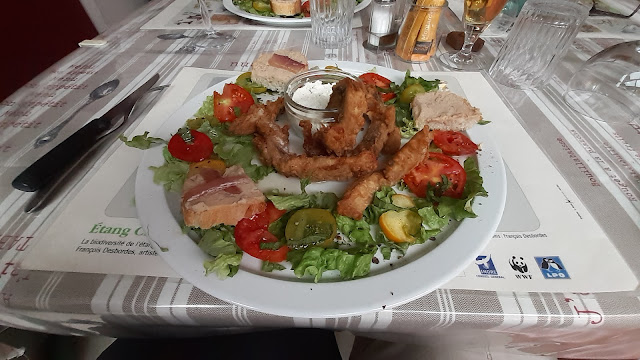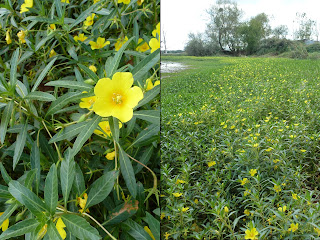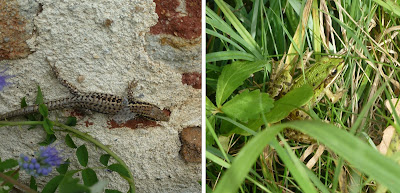This is an account of a personal visit to La Brenne, in mid-France. The tourist information about the ‘parc naturel régional’ says it is the 'land of a thousand lakes' and ‘1001 surprises’. Most accounts say there are closer to 2,000 lakes, fish ponds created from the Middle Ages and since. These and the quiet country lanes and tracks are very attractive for wildlife, walking and cycling.
 |
| La Brenne, land of 1000 lakes. |
Our trip was by train, car hired locally, and bike. Here is the outline itinerary:
20
September: train Norwich to London, Eurostar St Pancras to Lille, overnight
Lille.
21 September: trains TGV to Paris Gare du Nord, transfer to Paris Austerlitz, Austerlitz to Chateauroux; hire car to a gîte in Mézières-en-Brenne.
22
September: car to la réserve naturelle nationale de
Chérine (several hides). Circular walk from Mézières-en-Brenne following route collected
from tourist information centre.
23
September: hired bikes for route 5, a 43kilometre circuit. Traditional French music
and country dancing at Hegarty’s in Villiers.
24
September: Coffee in Le Blanc, woodland edge walk near St Aigny.
 |
| Cressonière: stone structure once used to grow watercress. Water mill behind, at St Aigny. |
25
September: drive through Forêt de Lancombe,
circular walk around étang Duris, visit to riverside town of Saint-Gaultier.
 |
| Good moaning. We were just pissing by ... in Saint-Gaultier. |
26
September: electric bikes, following parts of three of the marked circuits in
the regional nature park.
27 September: two
triangular walks from Le Blizon, north of Rosnay, refreshments (as yesterday)
at Maison du Parc.
28 September: returned car to Chateauroux, train to Paris Austerlitz, short walk to Austerlitz metro to go to Gare du Nord, Eurostar to St Pancras, Liverpool Street to Norwich.
 |
| On one of the circuits from Le Blizon. |
We loved the area. It’s very rural, very quiet, and wonderfully flat – flatter than going out from home in the Norfolk Broads – for exploration by bicycle. Mézières-en-Brenne is the obvious base, a quiet town with enough shops – a small supermarket called Proxi, boulangerie, a butcher with ready-made meals for sale – and black redstart singing on rooftops. There is an excellent tourist information office and the Moulin nearby where bikes can be hired. We also ate out in two very nice and sensibly priced restaurants: Hegarty’s in Villiers and the all-in-one café/shop/restaurant in Saint-Michel-en-Brenne called Le Saint Cyran.
 |
| Fried carp, from the local fishponds (étangs), a local speciality, very nice. And good to see LPO (BirdLife France) on the place mat. |
 |
| Quiet roads and well-marked routes for cycling. |
Would this make a Honeyguide holiday, one without the need for flights? For wildlife appeal, certainly. For practical reasons, it would be challenging. Transferring across Paris by train can be tricky. Where we hired a car in Chateauroux, a comfortable three-quarters of an hour away from Mézières-en-Brenne, they didn’t have minibuses, so it would mean going somewhere further e.g. Tours. Accommodation would need to be found: the hotel in Mézières-en-Brenne was shut for refurbishment. So there’s no easy fix –I like easy – and the 2024 programme is pretty full already. It’s not ruled out for the future.
 |
| Bikes again. |
 |
| Cattle with cattle egrets. |
 |
| Night heron daytime roost. |
On birds of prey, buzzards were ten-a-penny, plus marsh harrier, sparrowhawk, hobby and kestrel. There were a few migrants: two pied flycatchers, two wheatears, yellow wagtail, blackcap, scores of chiffchaffs.
We found some interesting autumnal flowers, as the photos show.
 |
| Autumn lady's tresses. In the gite's back garden! |
 |
| Goldilocks aster Galatella linosyris. |
 |
| Meadow saffron, a roadside patch. |
 |
| Water primrose Ludwigia grandiflora, known as an invasive alien, from central America, though pretty. |
Mammals: roe deer, red deer heard regularly (being rutting season), coypu, red squirrel, wild boar rootings.
Reptiles/amphibians: wall lizard, green lizard, grass snake, European pond terrapin, pool frog.
 |
| Wall lizard, pool frog. |
Dragonflies/damselflies: thousands of common darters, migrant hawker, willow emerald, winter damselfly.
 |
| Winter damselfly. |
Other notable invertebrates: three hummingbird hawkmoths on the ‘hot-lips’ Salvia in the gîte’s garden, aggregations of ivy mining bees, hornets, fire bugs, praying mantis, red swamp crayfish.
 |
| Praying mantis, red swamp crayfish, European hornet. |
Thanks to Ian Barthorpe from RSPB Minsmere for lending us his Crossbill Guide to the Loire and La Brenne.
Chris Durdin




No comments:
Post a Comment